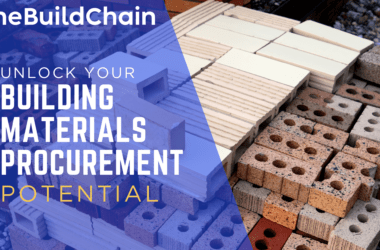Thriving in a dynamic construction market requires strategic approaches and adaptability.
Strategic Planning
Develop a clear and flexible business strategy that accounts for market dynamics, economic trends, and regulatory changes. Regularly review and adjust the strategy based on the evolving landscape.
Market Intelligence
Stay informed about market trends, materials prices, and emerging technologies. Utilise market intelligence to make informed decisions, negotiate better deals, and identify new opportunities.
Diversification of Services
Diversify the range of services offered. By expanding expertise into related areas, SME contractors can tap into diverse markets and reduce dependency on specific project types.
Supplier Relationships
Cultivate strong relationships with suppliers. Building partnerships can lead to better terms, discounts, and priority access to materials , enhancing the efficiency of procurement processes.
Collaborative Procurement
Explore collaborative procurement models with other SME contractors. Joint procurement efforts can increase purchasing power and negotiating leverage, resulting in cost savings.
Technological Adoption
Embrace digital procurement platforms, project management software, and other construction technologies. Technology enhances efficiency, transparency, and communication, making procurement processes more agile.
Sustainable Practices
Emphasise sustainability in construction practices. Many clients are prioritising environmentally friendly approaches sub contractors need to do the same. Adapting to sustainable construction methods can enhance competitiveness.
Financial Management
Maintain robust financial management practices. Efficient budgeting, cost control, and cash flow management are critical for SME contractors to navigate economic fluctuations.
Continuous Training
Invest in going training for your workforce. Equipping your team with the latest skills and certifications enhances your capacity to take on diverse projects and meet changing industry requirements.
Networking and Alliances
Actively participate in industry networks, associations, and alliances. Networking provides valuable insights, potential collaboration opportunities, and access to a broader pool of clients and suppliers.
Flexible Project Management
Adopt flexible project management approaches. Agile project management allows for quick adaptation to changes in project scope, timelines, and materials requirements.
Adaptive Marketing Strategies
Tailor marketing strategies to showcase flexibility and adaptability. Highlight the ability to customise solutions, respond to client needs, and navigate complex procurement challenges.
Risk Management
Implement robust risk management strategies, especially in materials procurement. Identify potential risks, establish contingency plans, and regularly review risk mitigation measures.
Read more: Risk Management Strategies for Construction Materials Procurement
Government Support Programmes
Explore government initiatives and support programmes. Governments often provide assistance to SMEs in the form of grants, subsidies, and training programmes.
Client Relationship Management
Build strong relationships with clients. Satisfied clients are more likely to provide repeat business and referrals, contributing to a stable project pipeline.
Lean Construction Principles
Implement lean construction principles to optimise efficiency and minimise waste in all aspects of the construction process, including construction procurement.
Thriving in the dynamic construction market requires a combination of strategic planning, adaptability, and a proactive approach to materials procurement. By staying agile and leveraging these strategies, UK SME contractors can position themselves for success amid industry fluctuations.
Beat Price Inflation, Product Availability Issues & Sustainability Challenges with The Build Chain
The Build Chain is an easy-to-use digital platform that transforms the process of buying materials. Our platform allows users to submit enquiries online, receive quotes to compare in one dashboard, then buy direct from the suppliers of choice.
It helps contractors assess whether they’re getting best price or not, makes it easier to find the required products, and enables sustainable procurement by reducing the distance materials need to travel.




